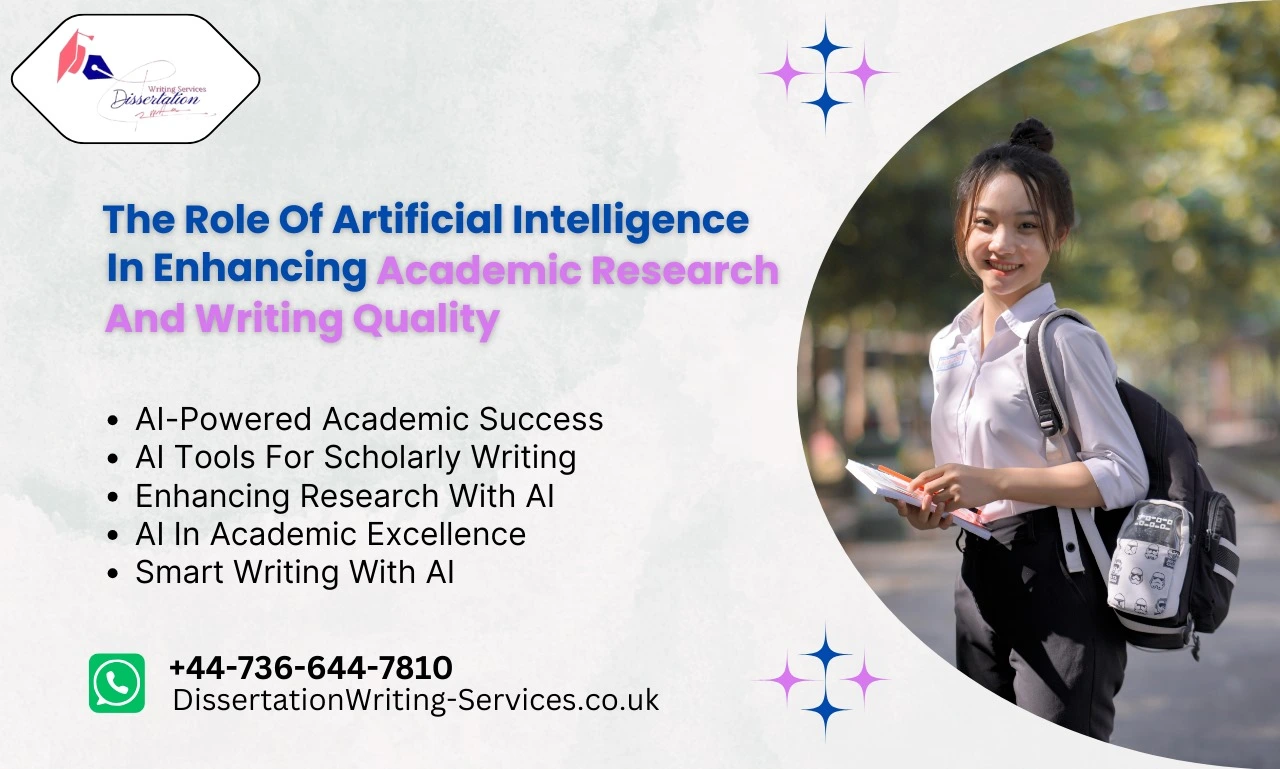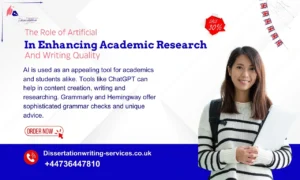Artificial intelligence (AI) plays an important role in improving the quality of thesis writing and academic research, especially in industries and education. Both excitement and ethical concerns have appeared as AI tools have entered academic research settings and classrooms. They are able to automate daily tasks and offer learning opportunities for individuals. AI-powered tools like Grammar and Chatting play a significant role for students in the field of academic writing. These tools can help people in their work to release their stress. They can assist researchers and students, enhancing quality and reducing the load of work.
The Appeal of AI in Academic Writing
AI is used as an appealing tool for academics and student assignment writing. Tools like ChatGPT can help in content creation, writing, and researching. Grammarly and Hemingway offer sophisticated grammar checks and unique advice. Platforms powered by AI, like Elicit, can even help researchers by finding relevant papers and simplifying complex data. Students and researchers can concentrate more on building arguments and analyzing data through a literature review of academic details. However, as AI becomes more integrated, these benefits must be balanced against potential drawbacks.
How AI Can Aid or Replace Traditional Writing Processes
- Enhancing Writing Quality
- Critical Thinking and Intellectual Engagement
- Supporting Research and Fact-Checking
Enhancing Writing Quality
AI tools have transformed the way students approach writing. Grammarly, for instance, goes beyond basic spell checks, helping students refine sentence structure, choose precise words, and achieve a formal tone appropriate for academic writing. Such tools save time while improving the clarity and professionalism of academic work, which is particularly beneficial for non-native English speakers.
Critical Thinking and Intellectual Engagement
As critical thinking skills and intellectual engagements are enhanced by AI, its use can make us independent. While AI tools aid efficiency, there’s concern that they may also weaken students’ critical thinking skills. Engagement deeply with the material is very important in academic writing. Analyze complex ideas and present nuanced arguments. If students become too dependent on AI to generate and organize ideas, they may miss out on the cognitive rigor that traditional writing processes encourage.
Supporting Research and Fact-Checking
AI also plays a role in the research phase. Tools like Elicit streamline the process of literature review, surfacing relevant papers, highlighting key findings, and even identifying gaps in research. This makes it easier for students to conduct thorough, targeted research, which can otherwise be an overwhelming process. However, the effectiveness of these tools depends on proper use. students must still exercise judgment in selecting and interpreting sources.
Ethical Concerns and Challenges
Academic Integrity and Plagiarism
The possibility of misuse is one of the primary concerns regarding AI in academic writing. Academic integrity is questioned given AI’s capacity to quickly produce extensive content. When AI content is so customizable and accurate, the line between assistance from AI and academic services can be blurry. New policies and tools to detect AI-generated content are currently being investigated by educators and universities, but the ethical debate continues.
Originality and Intellectual Property
Another challenge is the question of originality. AI generates content based on vast amounts of data, which may accidentally produce phrases or ideas that resemble existing work, even without precise copying. While some argue that AI can still produce unique perspectives, others worry that over-relying on AI tools could suffocate students’ creative thinking and ability to develop unique arguments.
Replacing traditional writing processes?
While AI unquestionably improves academic writing efficiency, it is still up for debate whether it poses a threat to traditional writing skills. Composing has forever been more than assembling words; it’s about learning to think critically, making arguments that make sense, and developing a unique voice. Some educators are concerned that essential skills could decline over time as students increasingly turn to AI for writing assistance.
The Future of AI in Education
AI as a Learning Companion
AI is the most effective companion due to its ability to improve learning. Artificial intelligence (AI) tools can help students with the structure of essays, check for logical flow, or give feedback on drafts. Students can get support with AI that is according to specific needs, bridging understanding gaps and developing skills they might otherwise struggle with. AI also has the potential to make education more accessible by providing real-time assistance to students with learning disabilities and those studying languages other than English.
Conclusion:
In dissertation academic writing, the use of AI is challenging. But it is also a great opportunity for writers. The use of artificial intelligence (AI) gave us enormous benefits. It can help us to improve writing quality and can increase research abilities. AI can even tailor education to each student’s needs. However, placing too much faith in AI runs the risk of undermining academic work’s critical and creative thinking.
As AI continues to evolve, requiring adaptation from students, educators, and educational establishments, policies that safeguard academic integrity and encourage a balanced approach to this potent technology will need to be developed.
Students and AI may collaborate in the future of academic writing, but only if we carefully navigate this journey.








